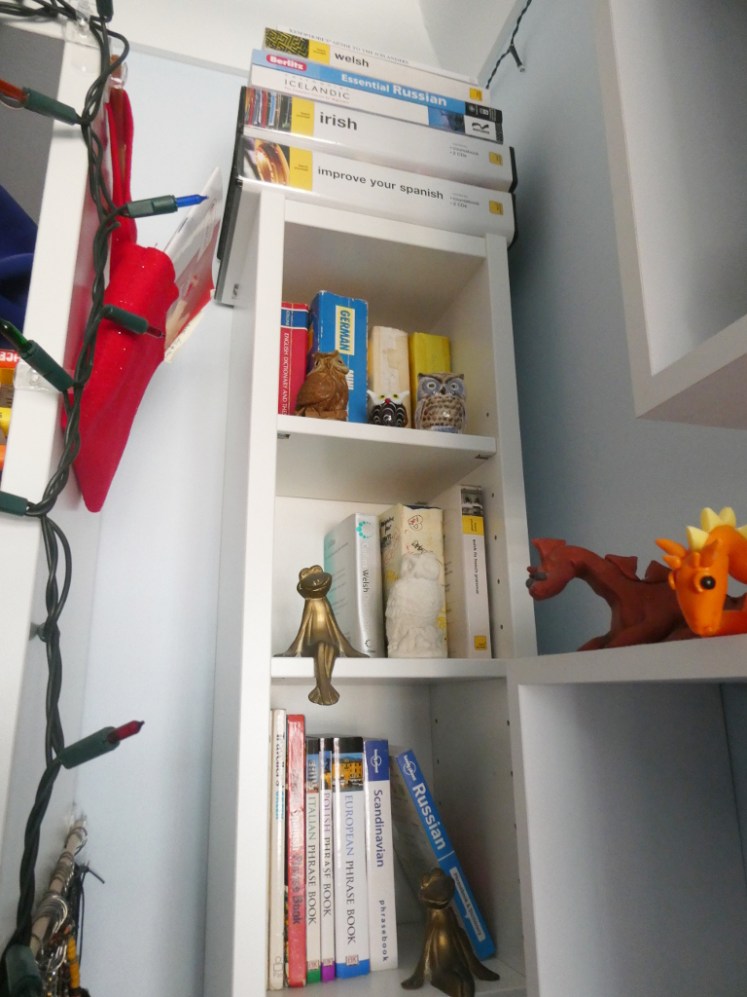One of the parts of connecting with cultures that we the Anglophones tend not to engage with so much is the language. As a person with a language background, that’s something I like to talk about from time to time. And as I look around my office even as I type this sentence, I can see the Norwegian course and grammar books propped up at the end of my desk, two shelves of miniature dictionaries and one of phrasebooks, the small heap of language books and courses piled on top of those shelves (plus the one that’s in my car because I thought listening to the CD might work even if I can’t do the written exercises while driving.

I’m a native English speaker. I have a degree in French and Spanish. I can speak Norwegian to the level of a toddler. I know lots of Icelandic nouns but no verbs. I can ask many questions in Russian as long as they revolve around the word “where”.
My point is simply that I like learning languages and talking in other languages and I’m really bad at learning them. But I want to tell you about learning them anyway.
- First and foremost, you can’t learn or develop or keep languages without practice. The reason why I can’t speak Spanish anymore is because I got out of the habit of using it for a year while I lived in Switzerland and I’ve had precious little need to use it since I graduated, whereas my Norwegian is ok because I use it around the house and out in public.
- If you’re going to start using your new language, it’s really helpful to have a phrase or two that you’re going to use a lot. When I started Norwegian, that phrase was “for en vakker hund!” and still the bits that I use out and about are mostly either about dogs or phrases adapted from phrases about dogs. Once you’re comfortable – really comfortable – pulling out your favourite phrase and adaptations thereof, more of the language will slip into place.
- You need to be able to hear your language of choice while you’re learning it. You can only get so far from written materials. Learning it in person with someone who already speaks it is best but Duolingo will do the job for quite a few popular languages.
- That said, don’t depend entirely on Duolingo. When I started Norwegian, an app called Mondly was great for getting me speaking and I only went to Duolingo when I started to want a bit more hint of grammar. Not that Duolingo teaches grammar – it waves it vaguely in your direction and expects you to infer it all. YouTube videos can be good for explaining things like that. In fact, YouTube is probably next best to learning in person but somehow I don’t like watching videos.
- The Teach Yourself resources are pretty good. I know you probably didn’t get much out of your school French lessons but exercises and repetition do work and being forced to listen closely and pick out the correct answer does make you think more about what you’re learning.
- Immersing yourself in a language is great. Whether that’s living in a place where it’s spoken, watching TV, listening to the radio – it doesn’t replace actively learning but it’s good to be hearing it around you, to recognise words and sentence structure and context. Similarly, reading books can be helpful – stick to pretty simple children’s ones – after about four years, I’m only halfway through the first Harry Potter book in Norwegian.
- Learning a new language will teach you how much you don’t know about your own language. You learnt it as a baby; no one taught you about verbs and adjectives and sytax and suffixes. You might well discover you have to learn the language of language and a certain amount of theory before you can get on with actually learning your new language.
- If you’re learning a language that has a different alphabet, spend a long time getting comfortable with that alphabet before you move on to learning a language using it. You’re going to want to be a bit more comfortable with reading than just deciphering one symbol at a time before you can start putting words and sentences together.
- I know everyone says it but if you’re planning to use the language in the place where it’s spoke, you’ll want to start with the pleasantries – please, thank you, good morning, where is, excuse me, I speak/don’t speak, that sort of thing. Bear in mind if you’re going to ask simple questions, you’re not necessarily going to get a simple answer back.
- You have to be learning for the right reason – the right reason being because you want to. Adult brains aren’t wired for easy language learning and if you’re trying to force it, it won’t go in. Do it because you want to, because you enjoy it, because it’s fun, because your brain wants to.
I’m pretty bad with nos 1 & 10. I don’t practice, mostly because my brain doesn’t want to. So I’m going to try to trick it into wanting to by actually doing it. I like speaking Norwegian. I’d like to bring it to the level of a primary school child. It’s May 25th today. I’m going to practice my Norwegian more regularly over the next month and take up a new language as well and I’ll update you on how it’s all gone on June 25th.